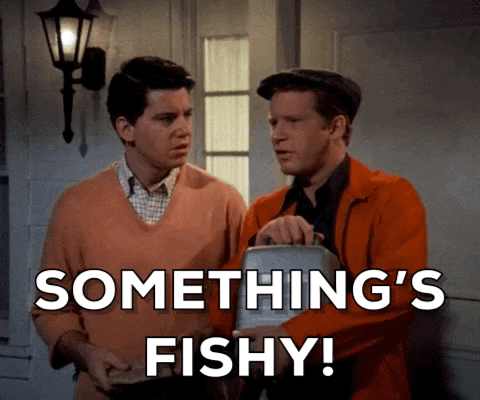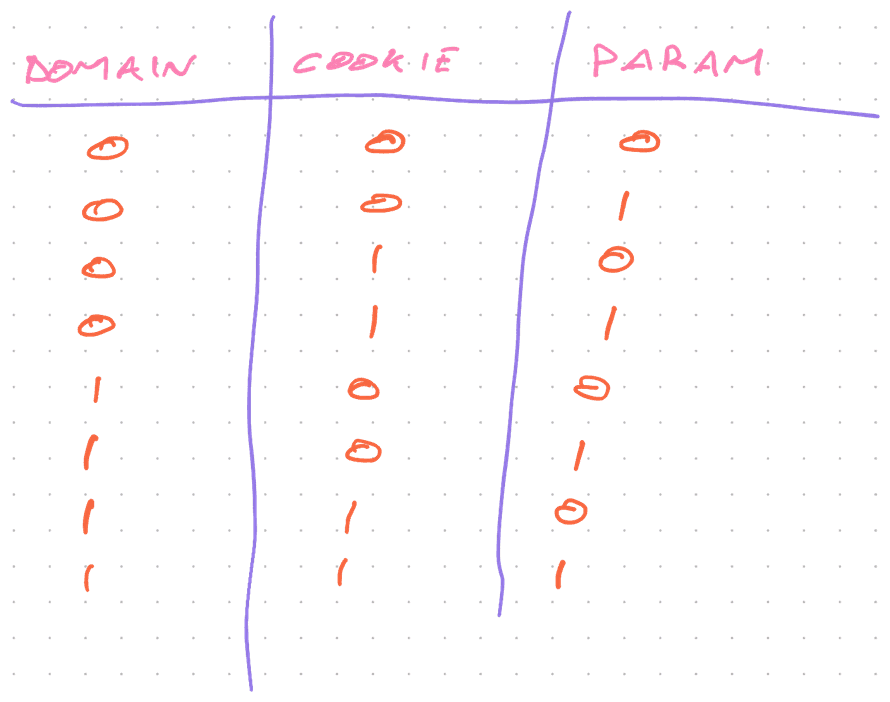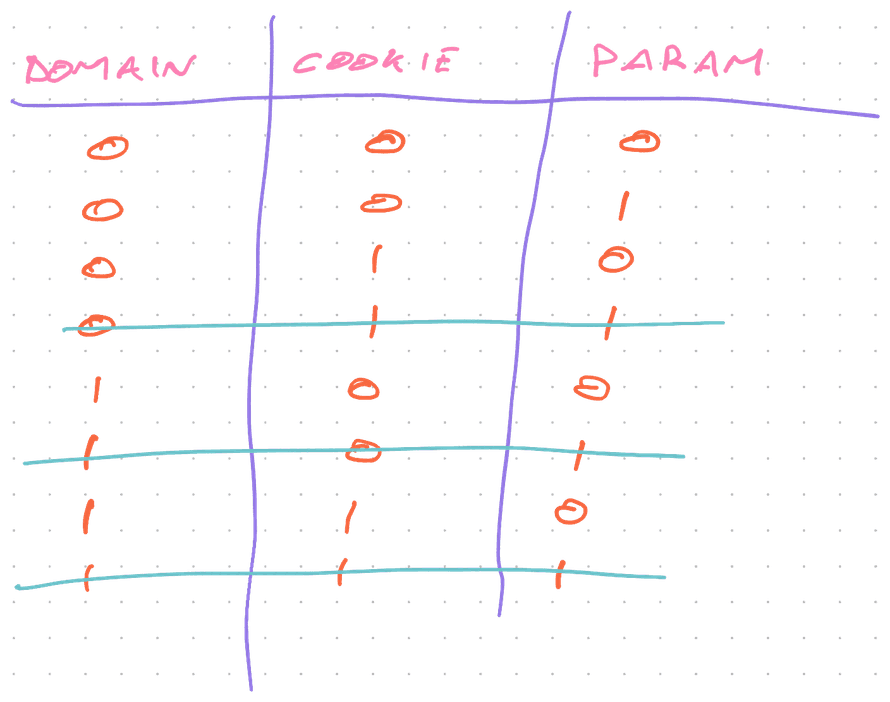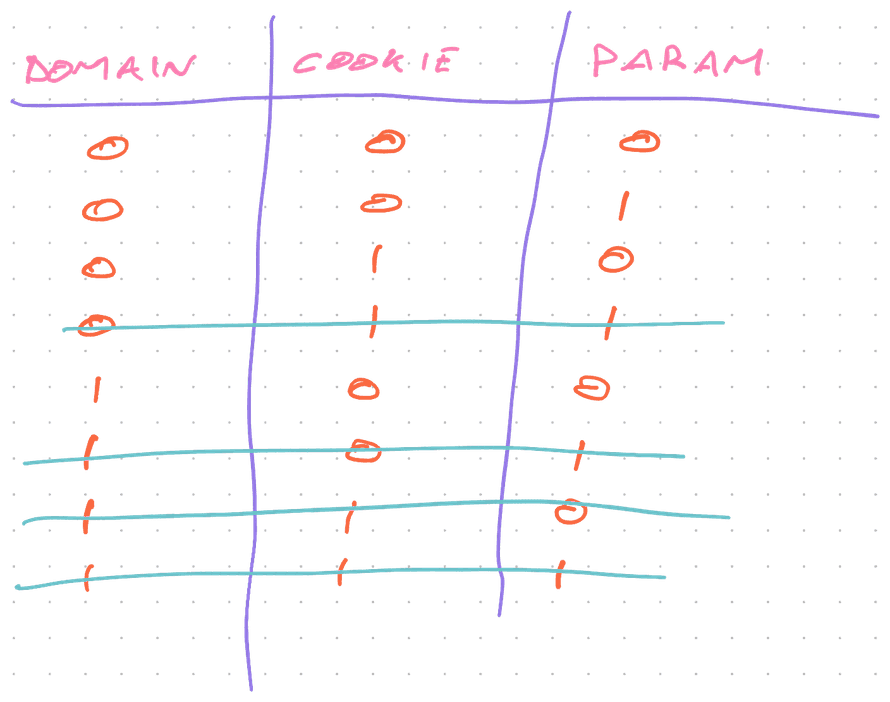"Hey Bob, we need a function that returns the current environment name so QA can test our apps"
Okay that's easy enough.
You're building a utility method for every project. Something that checks an env= param and lets you run web apps against production, QA, and local environments.
class EnvironmentHelper {
get currentEnvironment(): string | null {
let env = null;
if (typeof window !== "undefined") {
env =
new URLSearchParams(window.location.search).get("env");
}
return env;
}
URLSearchParams parses the window.location.search string into a Map and you .get() the env param. If the param isn't there, the value is null.
Your spidey senses were tingling so you made sure window is defined. Lets you run this code in server-side rendering.
Job well done 👌
"Hey Bob, would be cool if we didn't need to add ?env=development on localhost and ?env=production on production"
Damn, that would be cool.
You add some defaults.
class EnvironmentHelper {
private get defaultEnvironment() {
return window.location.hostname.endsWith("company.com")
? "production"
: "development";
}
get currentEnvironment(): string {
let env = null;
if (typeof window !== "undefined") {
env =
new URLSearchParams(window.location.search).get("env");
}
return env || this.defaultEnvironment;
}
That wasn't so hard. If there's no param, pick a default value based on the current domain. "production" in production and "development" everywhere else.
Going to break in QA environments and that's okay. The QA team knows to add ?env=qa when testing.
"Hey Bob, you know what would be really cool? If we remembered the environment even if someone drops the param by accident"

That's a great idea!
You npm install js-cookie and get to work.
import Cookies from "js-cookie";
class EnvironmentHelper {
private get defaultEnvironment() {
return window.location.hostname.endsWith("company.com")
? "production"
: "development";
}
get currentEnvironment(): string {
let env = Cookies.get("env");
if (typeof window !== "undefined") {
env =
new URLSearchParams(window.location.search).get("env");
}
if (env !== Cookies.get("env")) {
Cookies.set("env", env);
}
return env || this.defaultEnvironment;
}
You read the env cookie, check the URL param, and update the cookie when those don't match. Return the environment or default based on domain.
Job well done!
Function's getting a little complicated, but eh it's still simple enough right? Easy to reason about.
Deploy 🚀
Hidden complexity in simple code
You get bug reports. Something's fishy.
Works okay on localhost, seems fine enough in production, but QA environments are acting weird. On every 2nd page load, they start hitting production servers.

This function ain't so simple after all. What did you miss?
You have 3 pieces of state. Each can be set or not set. How many states is that?
Bet you it's more than you think 😛
Lemme show you a trick from college

You write a binary truth table. Each column is a variable, 0 means empty, 1 means set.
2^3 gives you 8 different states to look at.
Your function has just 4 conditionals, hmm 🤔
We can discard some because of precedence rules. ?env= param always wins, so you can drop all but one row where it's set.

Same is true for cookie. It always wins over the domain.

We're down to 4 states and 4 conditionals. Should be fine now, right?
Beware of bugs in the above code; I have only proved it correct, not tried it. ~ Donald Knuth
Test the code!
What the heck's still missing? Let's add some tests. More tests than you think.
describe("currentEnvironment", () => {
describe("no cookie, no url param", () => {
it("returns development for localhost", () => {
mockEnvCookie("")
mockEnvParam("")
window.location.hostname = "localhost"
expect(EnvironmentHelper.currentEnvironment).toBe("development")
})
it("returns production for yup.com", () => {
mockEnvCookie("")
mockEnvParam("")
window.location.hostname = "company.com"
expect(EnvironmentHelper.currentEnvironment).toBe("production")
})
})
describe("no cookie, yes url param", () => {
it("returns url param", () => {
mockEnvCookie("")
mockEnvParam("swizec")
expect(EnvironmentHelper.currentEnvironment).toBe("swizec")
})
it("sets cookie", () => {
mockEnvCookie("")
mockEnvParam("swizec")
EnvironmentHelper.currentEnvironment
expect(Cookies.get("env")).toBe("swizec")
})
})
describe("yes cookie, no url param", () => {
it("returns cookie", () => {
mockEnvCookie("swizec")
mockEnvParam("")
expect(EnvironmentHelper.currentEnvironment).toBe("swizec")
})
})
describe("yes cookie, yes url param", () => {
it("returns url param", () => {
mockEnvCookie("swizec")
mockEnvParam("development")
expect(EnvironmentHelper.currentEnvironment).toBe("development")
})
it("updates cookie", () => {
mockEnvCookie("swizec")
mockEnvParam("development")
EnvironmentHelper.currentEnvironment
expect(Cookies.get("env")).toBe("development")
})
})
})
Yep, 7 tests for just 4 states. And I think that's still missing some helpful tests.
So, what was the bug?
🤦♀️
Bug's right here:
if (env !== Cookies.get("env")) {
Cookies.set("env", env)
}
That means we overwrite the cookie with an empty value when there's no URL param. Should look like this:
if (env && env !== Cookies.get("yup-env")) {
Cookies.set("yup-env", env)
}
That simple function took 2 days off my life. All because I was too damn proud to write tests the first time.
Happy coding ❤️
Cheers,
~Swizec
PS: this situation adapted for brevity, IRL there were some other functions involved further obscuring the complexity
Continue reading about How tests uncover hidden complexity in simple code
Semantically similar articles hand-picked by GPT-4
- Configuring your JAMStack app for prod vs. dev
- How to configure Jest with TypeScript
- BrowserStack – a less painful way to test weird browsers
- [CodeWithSwiz 21] useAuth beta support for Firebase 🎉
- Exploring NextJS with a headless CMS, pt4 – CodeWithSwiz
Learned something new?
Read more Software Engineering Lessons from Production
I write articles with real insight into the career and skills of a modern software engineer. "Raw and honest from the heart!" as one reader described them. Fueled by lessons learned over 20 years of building production code for side-projects, small businesses, and hyper growth startups. Both successful and not.
Subscribe below 👇
Software Engineering Lessons from Production
Join Swizec's Newsletter and get insightful emails 💌 on mindsets, tactics, and technical skills for your career. Real lessons from building production software. No bullshit.
"Man, love your simple writing! Yours is the only newsletter I open and only blog that I give a fuck to read & scroll till the end. And wow always take away lessons with me. Inspiring! And very relatable. 👌"
Have a burning question that you think I can answer? Hit me up on twitter and I'll do my best.
Who am I and who do I help? I'm Swizec Teller and I turn coders into engineers with "Raw and honest from the heart!" writing. No bullshit. Real insights into the career and skills of a modern software engineer.
Want to become a true senior engineer? Take ownership, have autonomy, and be a force multiplier on your team. The Senior Engineer Mindset ebook can help 👉 swizec.com/senior-mindset. These are the shifts in mindset that unlocked my career.
Curious about Serverless and the modern backend? Check out Serverless Handbook, for frontend engineers 👉 ServerlessHandbook.dev
Want to Stop copy pasting D3 examples and create data visualizations of your own? Learn how to build scalable dataviz React components your whole team can understand with React for Data Visualization
Want to get my best emails on JavaScript, React, Serverless, Fullstack Web, or Indie Hacking? Check out swizec.com/collections
Did someone amazing share this letter with you? Wonderful! You can sign up for my weekly letters for software engineers on their path to greatness, here: swizec.com/blog
Want to brush up on your modern JavaScript syntax? Check out my interactive cheatsheet: es6cheatsheet.com
By the way, just in case no one has told you it yet today: I love and appreciate you for who you are ❤️

